There’s nothing like writing down all the rules for a game to keep yourself honest. You can quickly see if complexity is spiraling out of control, and, most importantly, you get to see if your expectations of the design match the reality of the game.
So I decided to write a “rulebook” for Lasting Legacy. I put rulebook in quotes because Lasting Legacy isn’t 100% a board game. There’s a light simulation component behind the scenes that is opaque to the player, but everything else can be treated like a board game. I figured it would be a good exercise for me, and maybe a good reference for early testers so they know what’s going on without a fancy tutorial.
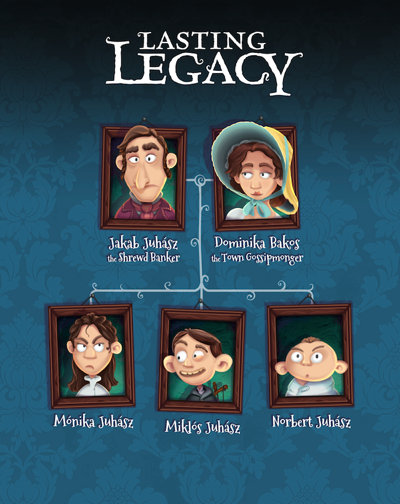
I’m happy with the final result. It’s about three pages of generously-spaced rules without any images, which beats a lot of board games out there.
A word of caution: This is not trying to be a funny, engaging rulebook. It’s a dry, to the point, description of all the rules in the game, arranged in the best way to understand all the concepts in a single read. It’s also not a “How to play” document. I think that could be another interesting exercise for down the line, where I just focus on the bare minimum to get a player playing.
Lasting Legacy Rulebook
1. Overview
Goal
Gain the highest ![]() Legacy possible.
Legacy possible.
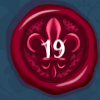
Setting
Guide a European family around the 19th century through several generations. Socialize and find suitable marriage partners to grow you family, so you can earn ![]() Gold,
Gold, ![]() Prestige, and ultimately,
Prestige, and ultimately, ![]() Legacy.
Legacy.

2. Concepts
Note: Any numbers shown here are just the defaults. There are always effects in the game that can modify those numbers up or down.
Family members
People in the family tree are called family members. Family members under 14 years old are considered children. They’re represented with round frames and don’t have any special abilities. Once they become adults they can choose between one or more occupations, depending on their education level. Adult family members will have children based on their age and fertility.
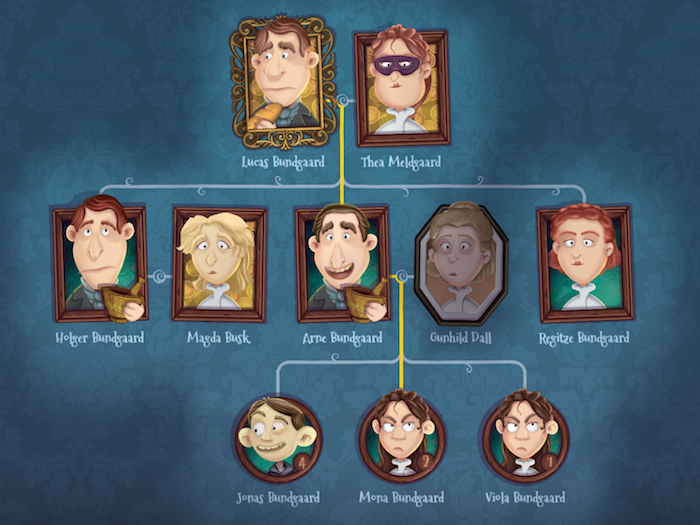
The head of the family, indicated with a special frame, defines which family members can be used at any given time. Only the head of the family, their spouse, and people under them (children and heirs) are enabled. Other family members are disabled and can’t be used.
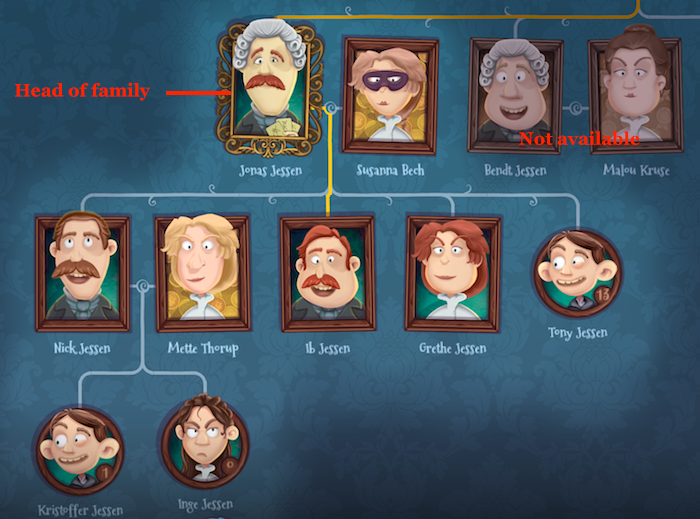
Occupations
Every adult member can have an occupation. The clothes and items people have represents their occupation. Occupations can be passive or active:
- Passive occupations have a permanent effect on the game. All the current effects are shown in the effect window.
- Active occupations provide you with a potential action you can perform by clicking on the occupation button.
Some occupations require a minimum education to appear as a choice. Occupations come in 4 rarities: common, uncommon, rare, and unique. Unique occupations will appear at most once per game. Occupations also could have one or more time periods during which they can appear: early, middle, or late in the game.

Personality
Every adult family member and friend has personality traits that consists of a series of likes and dislikes.

Friends
Your family friends are shown along the bottom of the screen, in oval frames. The smiley face shows their friendship level towards the family. Each year friendships drop a fixed amount. When the friendship level for a friend drops to 0, the face turns blue, and the following year that friend leaves.
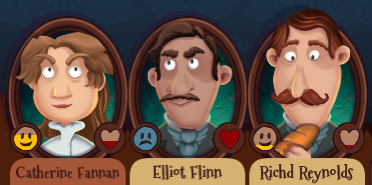
Friends can join your family through marriage. The heart in the friend’s frame represents how much they love someone in your family. Love is determined by many factors, including personality match, sexual preference, age similarity, and friendship amount. If that love level is above a certain threshold, it means they’re in love with someone and they’re willing to marry that person (see section 3: Proposing and Accepting Proposals).
Gold
![]() Gold is one of the primary resources in the game. It can be earned through actions and effects of people. Additionally, you may have a recurring
Gold is one of the primary resources in the game. It can be earned through actions and effects of people. Additionally, you may have a recurring ![]() Gold income (shown in the green arrow), and a recurring
Gold income (shown in the green arrow), and a recurring ![]() Gold payment (shown in the red arrow) that happen every year.
Gold payment (shown in the red arrow) that happen every year.

You can spend more ![]() Gold than you have, automatically taking a loan. Every year your
Gold than you have, automatically taking a loan. Every year your ![]() Gold is negative, your family pays 10% of that negative amount in interest payments. 200
Gold is negative, your family pays 10% of that negative amount in interest payments. 200 ![]() Gold is the debt limit. If you ever owe more that amount, the game ends in bankruptcy.
Gold is the debt limit. If you ever owe more that amount, the game ends in bankruptcy.
Prestige
![]() Prestige is the other primary resource of the game. It represents your social standing, and the more
Prestige is the other primary resource of the game. It represents your social standing, and the more ![]() Prestige you have, the more friend slots you have available. You always have at least one friend slot. For every 10
Prestige you have, the more friend slots you have available. You always have at least one friend slot. For every 10 ![]() Prestige you accumulate, you gain an additional friend slot up to a maximum of 10. Beyond that, you can accumulate more
Prestige you accumulate, you gain an additional friend slot up to a maximum of 10. Beyond that, you can accumulate more ![]() Prestige but you won’t gain any more slots.
Prestige but you won’t gain any more slots.

If at any point you gain a friend but you have no empty slots available, the friend with the lowest friendship leaves and the new one takes its place.
![]() Prestige can also be spent to do actions that are usually associated with negative social implications. Friends can leave you if your
Prestige can also be spent to do actions that are usually associated with negative social implications. Friends can leave you if your ![]() Prestige falls and you lose a slot occupied by a friend.
Prestige falls and you lose a slot occupied by a friend.
Unlike ![]() Gold,
Gold, ![]() Prestige can’t even go below zero. However, you can still use actions that would cause your
Prestige can’t even go below zero. However, you can still use actions that would cause your ![]() Prestige to go to zero. If you do, the person who did the action will be disowned by the family and won’t be part of the active family anymore.
Prestige to go to zero. If you do, the person who did the action will be disowned by the family and won’t be part of the active family anymore.
Health
People normally are healthy. Sometimes they will become sick due to a variety of reasons. From there, each year they can either become healthy, stay sick, or turn terminally ill. Once someone is terminally ill, unless something is done about it, they will die the following year.
Heir
A yellow line in the tree indicates the next heir to the head of the family, which is the preferred child of the current head of the family. Whenever a family member does an action that’s related to one of those traits, their parents will change their opinion of that person, either in a positive or negative way.
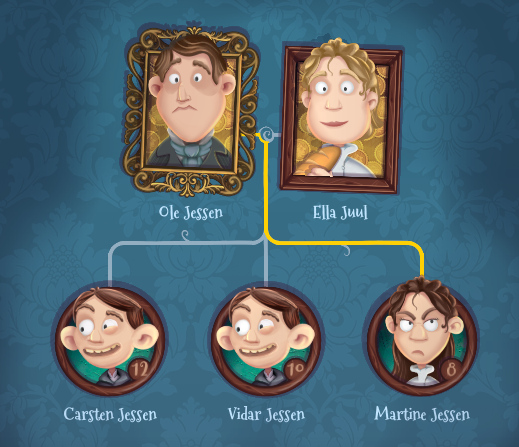
You can see the current opinion of someone by selecting them and looking at the smiley faces over each of their children. The more filled in that face is, the higher the parent’s opinion of that child is.
When the head of the family dies, the current heir becomes the new head of the family. The new head of the family also presents you with a new family goal due to their tastes and whims. This goal will let you gain ![]() Legacy by doing certain things during their time as head of the family.
Legacy by doing certain things during their time as head of the family.
Heirlooms
Heirlooms will give you ![]() Legacy based on different criteria. You start the game with one random family heirloom in your collection.
Legacy based on different criteria. You start the game with one random family heirloom in your collection.

Events
Every 30 to 70 years, an event will happen which will affect how things normally work. You will be notified 10 years before the event becomes active.
Countries
The majority of the people you’ll encounter during a playthrough come from the country you are playing in. You might encounter a few friends that come from neighboring countries. If you manage to add those friends to your family, that country will be unlocked and available for a future playthrough.
Countries add variety in the form of starting conditions, tweaked rules, and some unique occupations to those countries among other things.
3. How to play
Each turn, take one of the following actions. Each action will move the year forward one year.
Socialize
Gain one friend. The new friend’s age and education level is influenced by the person who socialized.
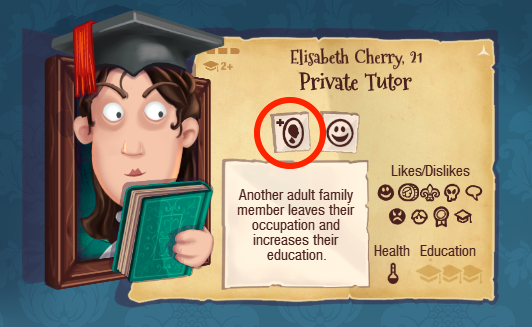
Visit Friend
Restore one friend’s friendship level to the maximum.
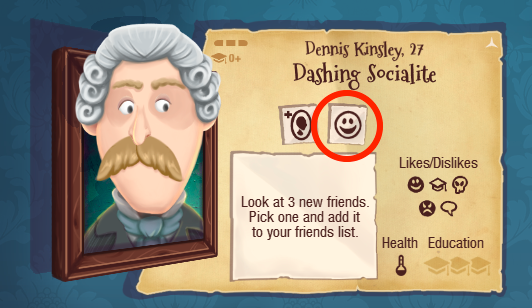
Propose in marriage
Men in the family can propose in marriage to friends. When you click on the propose in marriage button, only the friends who are willing to accept will be highlighted. Click on one of them to marry them.
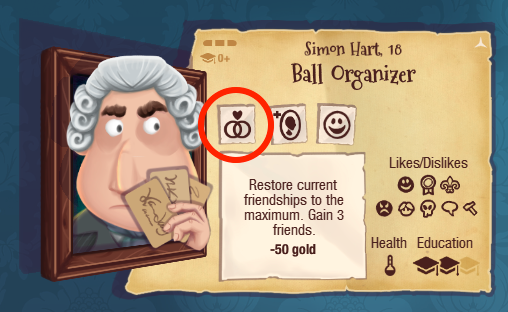
Women will sometimes have a dowry made out of ![]() Gold and/or
Gold and/or ![]() Prestige associated with them. When you marry a woman with a dowry, those resources are added to the family resources. On the other hand, women from the family will sometimes have to offer a dowry in order to marry a man. In that case, those resources will be taken away from the family resources.
Prestige associated with them. When you marry a woman with a dowry, those resources are added to the family resources. On the other hand, women from the family will sometimes have to offer a dowry in order to marry a man. In that case, those resources will be taken away from the family resources.
Accept marriage proposal
People in the family can receive marriage proposals from friends (indicated by the hearts above their heads). These proposals are only available for one year. If you accept it, they’ll be married right away. Otherwise, the friend will feel rejected and their friendship will drop more than usual.
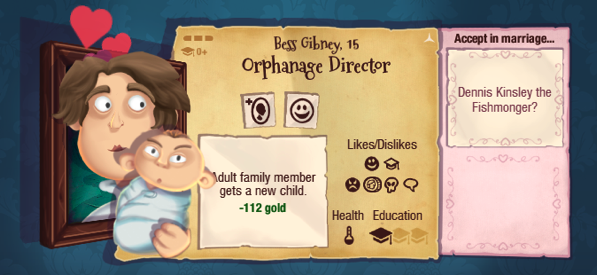
Choose an occupation
When a family member becomes an adult, they can choose an occupation (indicated by the question marks above their heads and their lack of occupation item and clothes).
If you don’t choose an occupation, they will pick one of the available ones after 5 years.
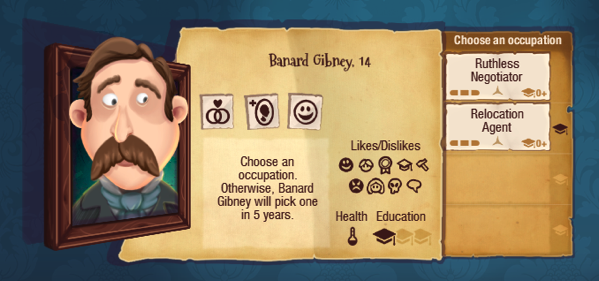
Use occupation action
You can click on the occupation action of any active family member to perform that action. Occupation actions are unique to each occupation. Sick people can’t do any occupation actions.
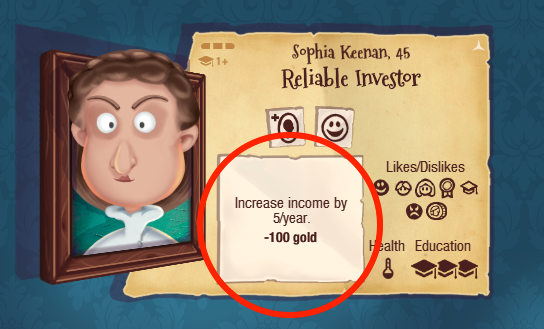
You can also use the occupation action of a friend. That’s like asking them for a huge favor, so they’ll do the action, but then leave.
Restore heirloom
Whenever someone in your family over the age of 50 dies, they will leave a family heirloom in the attic. Each heirloom in the attic has a cost associated with restoring it. You need to restore an heirloom to add it to your heirloom collection so it generates ![]() Legacy.
Legacy.
Pass
When there’s nothing else better to do, you can pass the turn and earn 5 ![]() Gold.
Gold.

4. End of game
The game will end when one of these conditions is true:
- You run out of time and the war starts. The year display will always tell you how many years you have remaining.
- You reach your
 Gold debt limit.
Gold debt limit. - The head of the family dies without an heir.
The amount of ![]() Legacy you have at the end of the game is your final score.
Legacy you have at the end of the game is your final score.
I’m really looking forward to playing Lasting Legacy – when I saw this post appear in my newsfeed I didn’t read it right away – I was saving it so I could enjoy it and fully appreciate it 🙂
I reckon you could turn this into a multiplayer card/board game so easily – each player could manage a family, you could share friends / marriage between families… the simulation / random elements could come from a deck or decks of cards, you could use counters or something to track gold and prestige and legacy. It’s almost a card/board game already.
But I guess stick to the computer game first 🙂
Good luck, keep working on it, keep putting out these posts.
Tim
You’re not the first person to say that, but actually I think the game would have to be changed significantly to avoid all the bookkeeping (aging, diseases, children…). But it’s a topic interesting enough that I think I’ll write a whole post about it soon. Thanks for bringing it up.